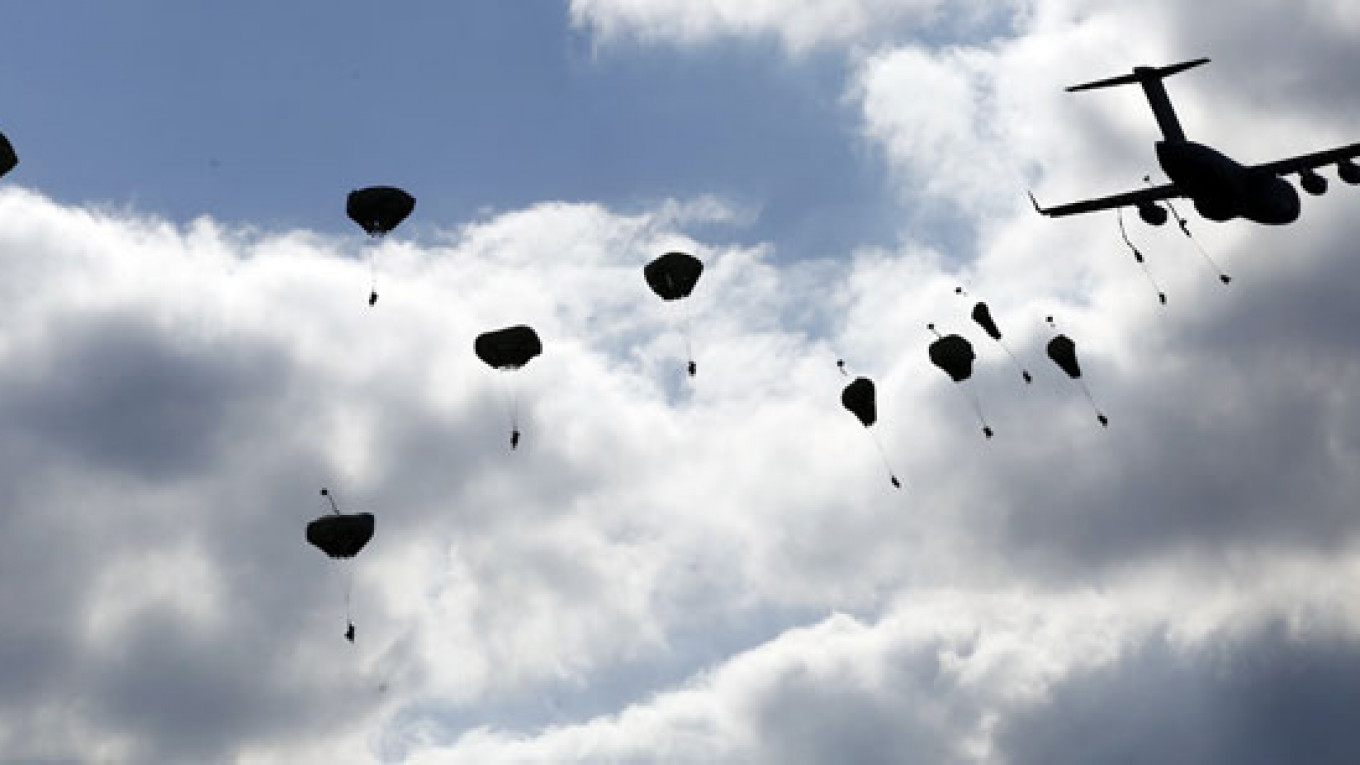Artillery and tank fire reverberate around a Baltic airstrip where U.S. paratroopers are fighting alongside Lithuanian soldiers. The battle is just an exercise and it only involves 150 U.S. soldiers — but the symbolism is clear.
With Eastern European states nervous about Russia after it annexed Ukraine's Crimea region and massed 40,000 troops on Ukraine's borders, the U.S. and NATO allies want to show Moscow that former Soviet republics on the Baltic are under the alliance's security umbrella.
"We are ready if something were to happen, but we are not looking to start any problems," said Sergeant James Day, from the U.S. 173rd Airborne Brigade, during war games on the vast Gaiziunai training ground in western Lithuania.
That chimes with NATO's current posture. In an initial response to Russia's intervention in Ukraine, the U.S. has sent 600 soldiers to the three Baltic countries — Estonia, Latvia and Lithuania — and Poland to take part in exercises to bolster NATO's presence in Eastern Europe. But the alliance has no inclination to intervene militarily in Ukraine.
Longer term, the crisis will have a profound impact on NATO's relations with Russia, its strategy and how it deploys, trains and equips its forces, although Europe has no wish to return to a Cold War-style confrontation between huge armies.
The crisis will compel the alliance to refocus on its core mission of defending its members after years in which its main effort has been far away in Afghanistan.
The 28-nation military alliance accuses Russia of tearing up the diplomatic rule book with its annexation of Crimea.
"For 20 years, the security of the Euro-Atlantic region has been based on the premise that we do not face an adversary to our east. This premise is now in doubt," NATO Deputy Secretary General Alexander Vershbow said last month.
The crisis, called a "game changer" by Secretary General Anders Fogh Rasmussen, will dominate the alliance's agenda as it prepares for a summit in Wales in September, which will mark the imminent end of the NATO-led combat mission in Afghanistan.
The U.S., Britain, Denmark, France, Canada and Germany have sent or promised extra fighter aircraft to increase patrols and training over the Baltics, Poland or Romania.
A fleet of nine minehunters from NATO countries has been dispatched to the Baltic and another task force of five ships to the eastern Mediterranean.
In the longer term, NATO will consider permanently stationing forces in Eastern Europe, something it has refrained from doing in the 15 years since the Czech Republic, Hungary and Poland joined the alliance after the fall of the Berlin Wall.
NATO will also have to think about how it deals with the unorthodox tactics used by Russia in Crimea, including exploiting political divisions, using large-scale military exercises as cover for intervention, and denying Russian troops were operating in the peninsula.
The crisis has already affected relations between NATO and Russia, which have cooperated uneasily in recent years in areas such as combating terrorism, piracy and Afghan drug-trafficking. NATO suspended cooperation with Russia last month over Crimea.
The damage is not likely to be repaired as quickly as after Russia's 2008 war with Georgia, when a freeze in top-level contacts between NATO and Russia lasted barely six months.
"As compared, say, with the reset after the Georgia war, this is going to be a much more prolonged and difficult period," said a senior NATO official, speaking on condition of anonymity.
President Vladimir Putin declared in March he had the right to invade Ukraine to protect Russian speakers there, causing alarm in NATO members Estonia and Latvia, which have large ethnic Russian minorities of their own.
Officials at NATO are asking themselves if Putin would seriously consider challenging a NATO member, although if it tangled with a NATO member state, Russia would also be risking a confrontation with the U.S.
"Just as NATO does not want a war with Russia, so too Russia does not want a war with NATO, because the risks on both sides are global and catastrophic," said Samuel Charap of the International Institute for Strategic Studies think tank.
So far, NATO has reinforced eastern allies with short-term deployments that will continue until at least the end of the year. If tensions with Russia persist, NATO may look at longer term ways to beef up its presence.
NATO's top military commander, U.S. Air Force General Philip Breedlove, said last week that NATO would have to consider permanently stationing troops in parts of Eastern Europe.
A Message from The Moscow Times:
Dear readers,
We are facing unprecedented challenges. Russia's Prosecutor General's Office has designated The Moscow Times as an "undesirable" organization, criminalizing our work and putting our staff at risk of prosecution. This follows our earlier unjust labeling as a "foreign agent."
These actions are direct attempts to silence independent journalism in Russia. The authorities claim our work "discredits the decisions of the Russian leadership." We see things differently: we strive to provide accurate, unbiased reporting on Russia.
We, the journalists of The Moscow Times, refuse to be silenced. But to continue our work, we need your help.
Your support, no matter how small, makes a world of difference. If you can, please support us monthly starting from just $2. It's quick to set up, and every contribution makes a significant impact.
By supporting The Moscow Times, you're defending open, independent journalism in the face of repression. Thank you for standing with us.
Remind me later.


